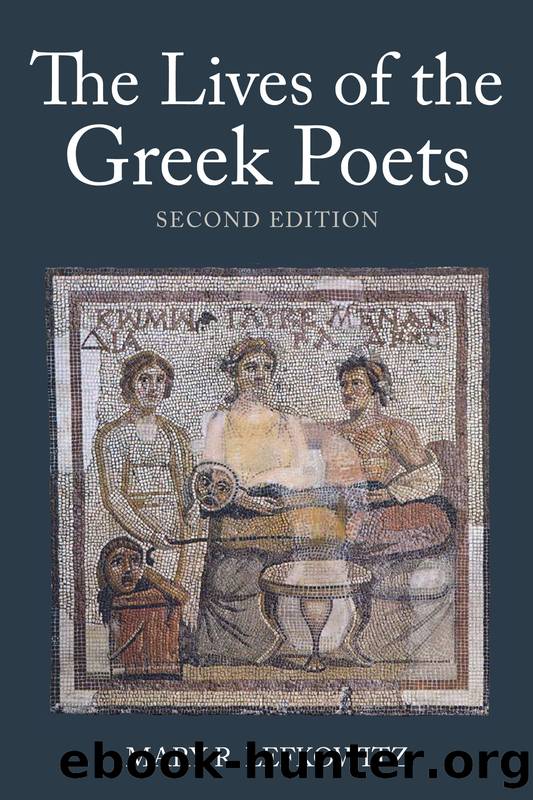The Lives of the Greek Poets by Mary R. Lefkowitz;

Author:Mary R. Lefkowitz; [Lefkowitz;, Mary R.]
Language: eng
Format: epub
Tags: Second Edition
ISBN: 9781472503084
Publisher: Bloomsbury
Published: 2012-09-15T05:00:00+00:00
Chapter 11
Hellenistic Poets
Much of the Greek poetry composed after the death of Alexander the Great in 323 B.C. has a retrospective and reflective character. Even as they created something new, poets living in the diaspora of Greek culture found ways to acknowledge the great literary legacy they had inherited.1 Included in that legacy was the tradition of creating biography, which survived and flourished throughout the Greek-speaking world. Even though the second-century B.C. author Satyrus was a native of the Black Sea town of Callatis, he was conversant with the works of the great tragedians and the comedies of Aristophanes. He also knew how earlier biographers had constructed lives for these poets; the interlocutors in his Life of Euripides consciously make use of passages in Aristophanesâ and Euripidesâ own dramas. Although modern scholars have often supposed, or at least hoped, that Hellenistic biographers had access to more-accurate information and were historically more sophisticated than fourth-century biographers, the surviving evidence suggests that, like the poets of their day, biographers preserved and respected the traditions of their craft. In this way some remarkable myths were invented that have influenced later literary criticism as pervasively as the fifth-century notion that Euripides was an atheist. The most influential of these stories is the so-called quarrel between the third-century poets Callimachus of Cyrene and Apollonius of Rhodes.
Virtually all modern assessments of Apolloniusâ work discuss his alleged differences with Callimachus, although no surviving text by either poet refers directly to a quarrel between them. The idea that they might have clashed derives from later interpretation, most specifically from an attempt to identify the critics to whom Callimachus refers in the prologue to his Aetia.2 Callimachus begins that poem by talking about his adversaries: âTelchines chatter at my song, ignorant men, who are no friends of the Muses, because I did not complete one uninterrupted song ⦠about kings ⦠or heroes in thousands of lines but instead like a child roll out a tiny taleâ (fr. 1.1â5 Pf). A little later he describes how Apollo advised him to keep his Muse thin, and to âwalk on untrodden pathsâ (23â28). The scholia to the Aetia prologue (1 p. 3 Pf) identify the Telchines as seven specific poets, but Apollonius is not on that list, and there does not appear to be room for his name on the papyrus. But according to his Suda entry, Callimachus wrote âa poem distinguished for its obscurity and abuse against a certain Ibos who was an enemy of Callimachusâthis was Apollonius who wrote the Voyage of the Argo (Argonautica)â (Kappa 227 = T1.13â15 Pf). No reason for the attack is given in the Suda, but an epigram attributed to âApollonius the grammarianâ says that âCallimachus is refuse; triviality, a wooden mind; the causer (aitios) is he who wrote the Causes (Aitia), Callimachusâ (13 Powell = FGE 53â54 = T 25 Pf).3 Then there is also the famous comment, âCallimachus the grammarian said a big book is like a big evilâ (fr. 465 Pf), which in fact does not refer specifically to the work of Apollonius or any other particular poet.
Download
This site does not store any files on its server. We only index and link to content provided by other sites. Please contact the content providers to delete copyright contents if any and email us, we'll remove relevant links or contents immediately.
| France | Germany |
| Great Britain | Greece |
| Italy | Rome |
| Russia | Spain & Portugal |
Fanny Burney by Claire Harman(26260)
Empire of the Sikhs by Patwant Singh(22777)
Out of India by Michael Foss(16695)
Leonardo da Vinci by Walter Isaacson(12821)
Small Great Things by Jodi Picoult(6697)
The Six Wives Of Henry VIII (WOMEN IN HISTORY) by Fraser Antonia(5246)
The Wind in My Hair by Masih Alinejad(4853)
The Crown by Robert Lacey(4579)
The Lonely City by Olivia Laing(4579)
A Higher Loyalty: Truth, Lies, and Leadership by James Comey(4568)
The Iron Duke by The Iron Duke(4128)
Millionaire: The Philanderer, Gambler, and Duelist Who Invented Modern Finance by Janet Gleeson(4119)
Papillon (English) by Henri Charrière(3925)
Sticky Fingers by Joe Hagan(3918)
Joan of Arc by Mary Gordon(3801)
Alive: The Story of the Andes Survivors by Piers Paul Read(3743)
Stalin by Stephen Kotkin(3732)
Aleister Crowley: The Biography by Tobias Churton(3435)
Ants Among Elephants by Sujatha Gidla(3282)
